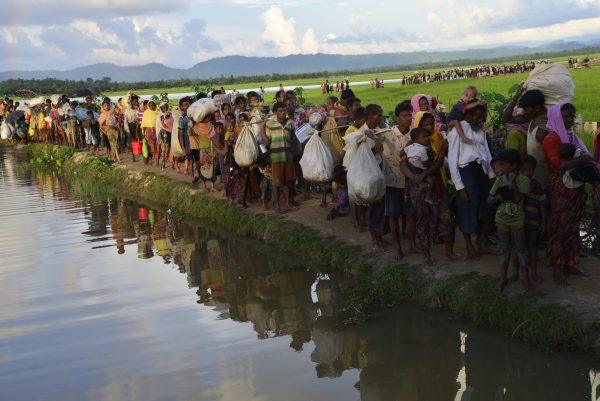
A delegation from military-ruled Myanmar has begun touring the refugee camps of southeastern Bangladesh to verify hundreds of potential candidates for a controversial pilot repatriation project. The delegation arrived yesterday in Teknaf, on the border with Myanmar, and will spend the week interviewing Rohingya refugees who have been shortlisted for the program.
According to a report by Reuters, which cited a Bangladeshi official responsible for administering the refugee camps in Cox’s Bazar, a total of 1,140 Rohingya are to be repatriated through the pilot project, of which 711 have had their cases cleared. The remaining 429 on the list were still being processed and their identities and places of origin verified.
Nearly 1 million Rohingya civilians are currently stranded in a series of large refugee camps around the town of Cox’s Bazar. Most fled to Bangladesh in August 2017, when the Myanmar armed forces launched a fierce “clearance operation” that saw civilians shot and dozens of villages razed to the ground – a series of attacks that U.N. officials said displayed “genocidal intent.”
Given the heavy financial burden that this crisis has imposed on the Bangladeshi government, Dhaka is understandably desperate to begin the repatriation of the Rohingya refugees. So far, it has resorted to relocating several thousand Rohingya refugees to the isolated and windswept island of Bhasan Char in the Bay of Bengal and pushed hard for the repatriation of Rohingya to Myanmar. Last August, Prime Minister Sheikh Hasina said that the Rohingya “are nationals of Myanmar and they have to be taken back.”
The aforementioned pilot program exists outside of the Joint Response Plans formulated by Bangladesh, with the assistance of the U.N. refugee agency UNHCR and other donor governments, which envisions the “sustainable repatriation of Rohingyas to Myanmar.”
This pilot repatriation is the result of a bilateral agreement between Myanmar and Bangladesh, mediated by the Chinese government. The arrangement dates back to 2018, when the three nations began holding trilateral consultations to move forward with the repatriation of Rohingya. Indeed, some have suggested that the country’s military junta, which led the expulsion of the Rohingya in 2017 and has little real desire to take them back, has agreed to speed up repatriation due to Chinese pressure.
On March 10, according to Bangladeshi media reports, ambassadors from eight countries, including Bangladesh and China, visited Rakhine State’s Maungdaw township, where junta officials showed off the preparations being made for the returnees. According to Bangladeshi media reports, China’s ambassador to Bangladesh Yao Wen expressed hopes that the first batch of refugees would be repatriated soon. Reuters quoted a Bangladeshi official who said it was unclear when the potential candidates would return to Myanmar.
China, of course, has its own reasons for supporting the repatriation plan. The northern part of Rakhine State which was home to the majority of the Rohingya refugees lies near the China-Myanmar Economic Corridor (CMEC), a series of infrastructure projects designed to link China’s Yunnan province to Myanmar’s coast, and it is in China’s interests for the region to be stabilized.
That said, there is good reason to think that the situation remains unsuitable for refugees to return – exactly the reason that the repatriations have not proceeded so far under the Joint Response Plans. To be sure, few refugees desire to remain indefinitely in the camps, which are plagued by insecurity, surging crime, and lack of livelihoods. Indeed, increasing numbers are undertaking dangerous ocean journeys in search of sanctuary in Malaysia or Indonesia.
But it remains unclear whether the political conditions that led to the expulsion of the Rohingya in 2017 have abated enough to permit large-scale returns. There is good anecdotal evidence that many refugees have a “well-founded fear of persecution” in Myanmar, and will need extra assurance and guarantees – guarantees that the Myanmar military, the very force that demonized them and expelled them in 2017, is in no position to provide.
In an interview with BenarNews, UNHCR spokesperson Regina De La Portilla said that conditions in Rakhine State “are currently not conducive to the sustainable return of Rohingya refugees.” While saying that refugees had the right to return to Myanmar if they wanted to, any repatriation “should be voluntary, in safety and dignity, and allow for sustainable reintegration in Myanmar.”
Then there is the conflict between the Arakan Army (AA) and the Myanmar military, which, although the two sides agreed to a ceasefire in November, is far from resolved, given the AA’s ambitions of autonomy – even independence – from the central state.
Whether or not this pilot repatriation goes ahead, a full return of the hundreds of thousands of civilians stranded in Bangladesh still remains many years away.
Myanmar, Bangladesh Readying Repatriation of More Than 1,000 Rohingya
Source: Frappler

0 Comments